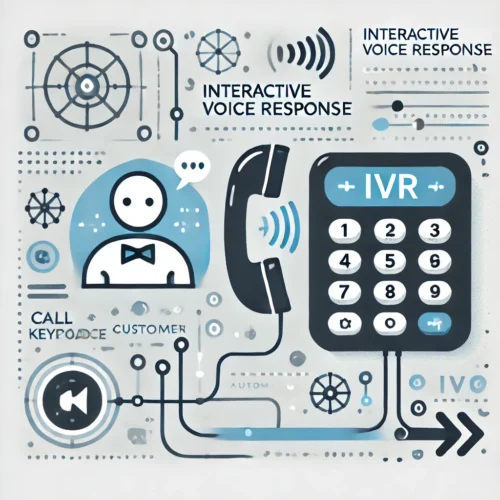
Which Industries and Businesses Benefit from VoIP Call Center Systems?
December 17, 2024What is Interactive Voice Response (IVR)?
Interactive Voice Response (IVR) is an automated telephony system that interacts with callers, gathers information, and routes calls to the appropriate recipients. By using pre-recorded voice prompts and DTMF tones (Dual-Tone Multi-Frequency) or speech recognition, IVR systems enable users to navigate a phone menu using their keypad or voice commands.
An IVR system is commonly used in customer service to direct callers to the right department, reduce wait times, and provide self-service options.
How IVR Works
- Caller Interaction: A caller dials into a company’s phone number and hears pre-recorded options.
- Input Gathering: The caller provides input using:
- Keypad (DTMF): Pressing numbers, e.g., "Press 1 for Sales."
- Speech Recognition: Speaking responses, e.g., "Say ‘Support’ to reach customer service."
- Call Routing: Based on the caller's input, the IVR system routes the call to the appropriate agent or provides automated assistance.
Applications of IVR
-
Customer Support
IVR systems allow businesses to automate routine tasks like balance inquiries, order status updates, and account management without human intervention. -
Appointment Scheduling
Healthcare providers, beauty salons, and other service-based businesses use IVR to manage bookings and send reminders. -
Payment Processing
Secure IVR systems enable callers to pay bills or invoices using their credit card or payment gateway via the phone. -
Surveys and Feedback Collection
Organizations use IVR to conduct post-interaction surveys to measure customer satisfaction. -
Emergency Notifications
IVR systems can broadcast important messages to customers during emergencies, such as service outages or severe weather warnings. -
Order Placement and Tracking
Retail businesses use IVR to allow customers to place orders and track delivery status without speaking to an agent.
Benefits of IVR Systems
-
Improved Customer Experience: Callers receive immediate attention without waiting for a human agent. Self-service options allow customers to resolve simple queries quickly.
-
Reduced Operational Costs: IVR automates repetitive tasks, minimizing the need for large customer service teams. Saves on labor costs while maintaining efficiency.
-
24/7 Availability: IVR systems are always accessible, allowing customers to interact with businesses outside working hours.
-
Efficient Call Routing: IVR ensures callers reach the correct department or agent, improving resolution times and reducing call transfers.
-
Scalability: Businesses can handle high call volumes without compromising service quality, especially during peak seasons or emergencies.
-
Increased Productivity: By automating basic tasks, agents can focus on handling complex or high-value customer issues.
-
Enhanced Customer Data Collection: IVR systems can capture and analyze customer data, helping businesses improve their services and make informed decisions.
-
Professional Image: A well-structured IVR system projects a professional and organized image, boosting customer trust.
Conclusion
Interactive Voice Response (IVR) systems are powerful tools that streamline communication between businesses and their customers. By automating processes, reducing wait times, and providing 24/7 access, IVR improves efficiency and customer satisfaction. Whether for customer support, payment processing, or data collection, IVR systems are essential for businesses aiming to optimize operations and provide a seamless customer experience.
Investing in a robust IVR system can significantly enhance productivity, reduce costs, and elevate your company’s overall performance.
